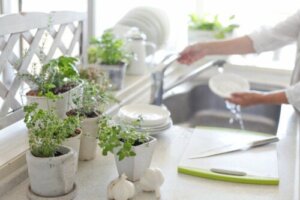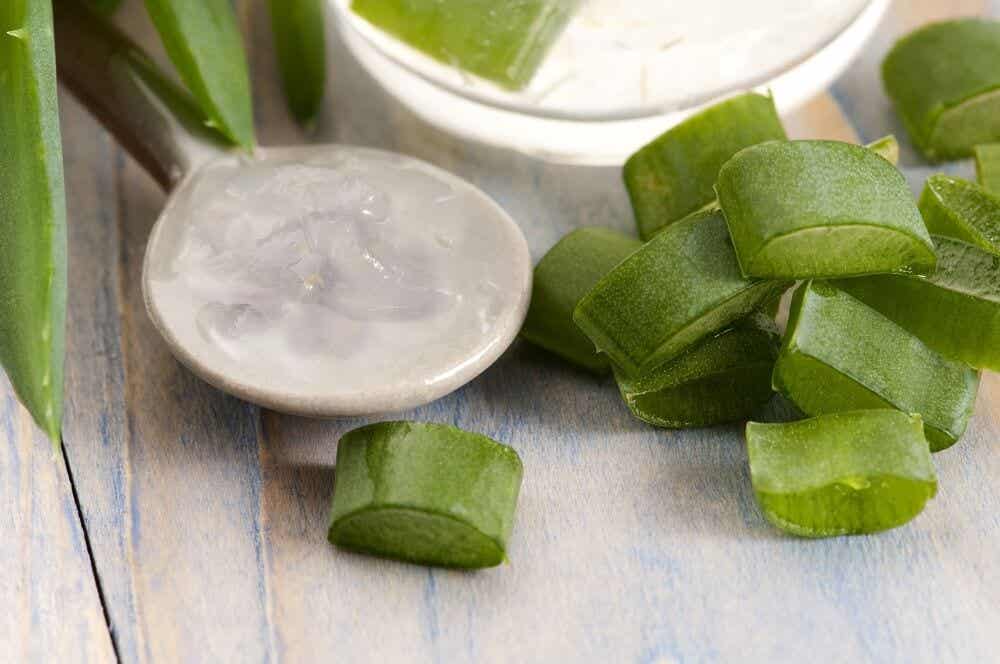5 Benefits of Having Plants in the Kitchen

You’ve probably heard about the benefits of having plants in the kitchen by now. However, we want to tell you a bit more.
Lavender, aloe vera, basil, mint, and rosemary are just some of the plants you can have in your kitchen. Best of all, they can provide you with a variety of benefits.
For instance, one of the advantages is that, if you have a small space, you can find a way to place them without losing the decorative touch.
Here are some tips and benefits of having your green area within the kitchen.
1. Plants can spice up your meals
Aromatic plants give a particular flavor to our dishes and, a great advantage is to have them fresh and at hand. Many people say that when they grow their own aromatic plants, they have a more concentrated smell.
Some ideas to plant in pots are basil, rosemary, cilantro, parsley, and mint. Surely you’re already thinking about what dish to add each aromatic plant too; just make sure that the pot or decorative can where you place it has holes in the bottom, so it can drain the water every time you water it.
Also read: How to Make Homemade Hanging Planters for Your Plants
2. They’re an emergency kit
When you’re cooking, small accidents sometimes happen; either a cut with the edge of a knife or a burn with oil, water, or a hot frying pan.
Although you can have your first aid kit within reach, some people claim that the aloe vera crystal helps regenerate the skin, in addition to moisturizing the area and relieving pain.
Keep in mind that aloe requires a place with natural light and ventilation, so you should place it near a window. If your plant is large, be careful not to overwater it, as you may drown its roots.

3. They give a decorative touch
Without a doubt, plants decorate the home. They bring color, joy and combine with any style, besides giving your house a constant fresh smell. They could also be the ideal time to bring out your creative side. Decorating a can or making a pot of your own to plant plants in will give your kitchen a unique and authentic look. Get to work!
4. Improve overall health
A review of studies published in Preventive Medicine Reports suggests that gardening may help reduce anxiety, depression, and body mass index (BMI), as well as improve quality of life and provide a sense of satisfaction.
Spending time with your plants in activities such as transplanting, pruning or watering could help take your mind off your daily routine and worries.
5. They purify the air
Certain plants are well known for their properties to clean or purify the air. Apart from giving you oxygen, they help reduce smoke and strong odors. To name a few examples, tiger tongue, areca, and rubber tree are great in this regard.
Tips for having plants in the kitchen
Plants require specific conditions and care. Also, take into account that not all plants can survive the heat of the kitchen.
That’s why we want to give you some tips that may be useful:
- Research which plants can be most useful in the kitchen.
- Make sure that the place where you place the plants is a little distant from the heat of the stove, smoke, and strong air currents.
- Place the pots in a luminous place where the sun doesn’t directly hit them for many hours.
- If your kitchen space is limited, a good option is to place plants in hanging pots.
- Avoid placing your plants near the sink, as they may get residue or detergent on them.
Discover: How to Sterilize Kitchen Utensils
Plants in the kitchen: Benefits beyond aesthetics
A green area can match any style and area of the house. However, what stands out the most is that having plants in the kitchen can bring many benefits. Among the most prominent are the reduction of anxiety and depression, air purification, and help in an emergency.
For elders, in particular, gardening activities have been linked to improvements in quality of life. Their mood boosts when they invest time in caring for nature.
Plus, you have a fresh plant ready to spice up meals! Just remember to put them in places that don’t receive direct smoke from the stove, that doesn’t have a strong draft, and that each pot has the necessary holes to drain the water when you water them.
All cited sources were thoroughly reviewed by our team to ensure their quality, reliability, currency, and validity. The bibliography of this article was considered reliable and of academic or scientific accuracy.
- Soga, M., Gaston, K. J., & Yamaura, Y. (2016). Gardening is beneficial for health: A meta-analysis. Preventive medicine reports, 5, 92–99. https://doi.org/10.1016/j.pmedr.2016.11.007
- Gozalo Vallepuga, Nuria, and Ana Luisa Caballero Navarro. “Aplicaciones terapéuticas para hacer frente a la depresión en ancianos: una revisión bibliográfica.”
This text is provided for informational purposes only and does not replace consultation with a professional. If in doubt, consult your specialist.








